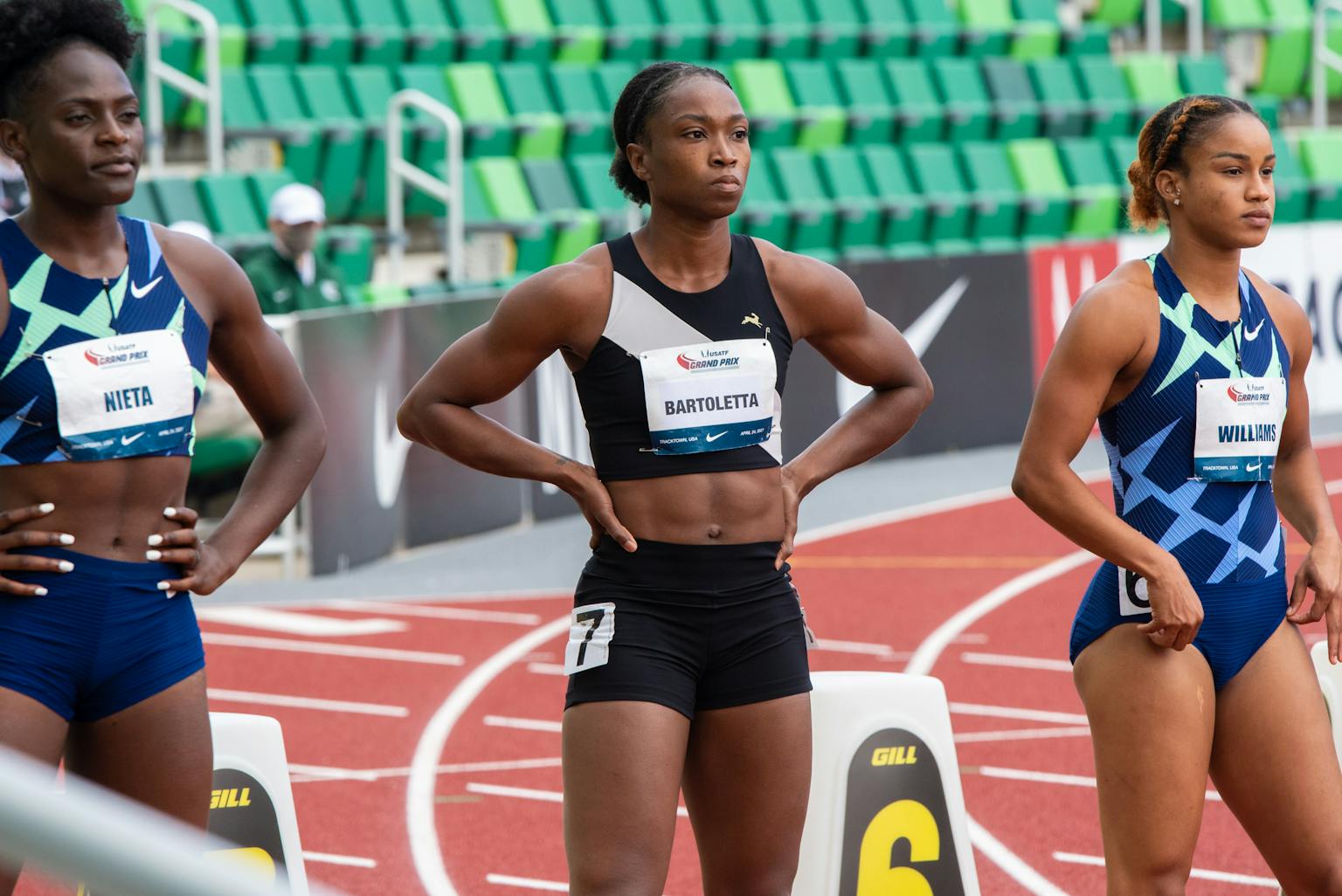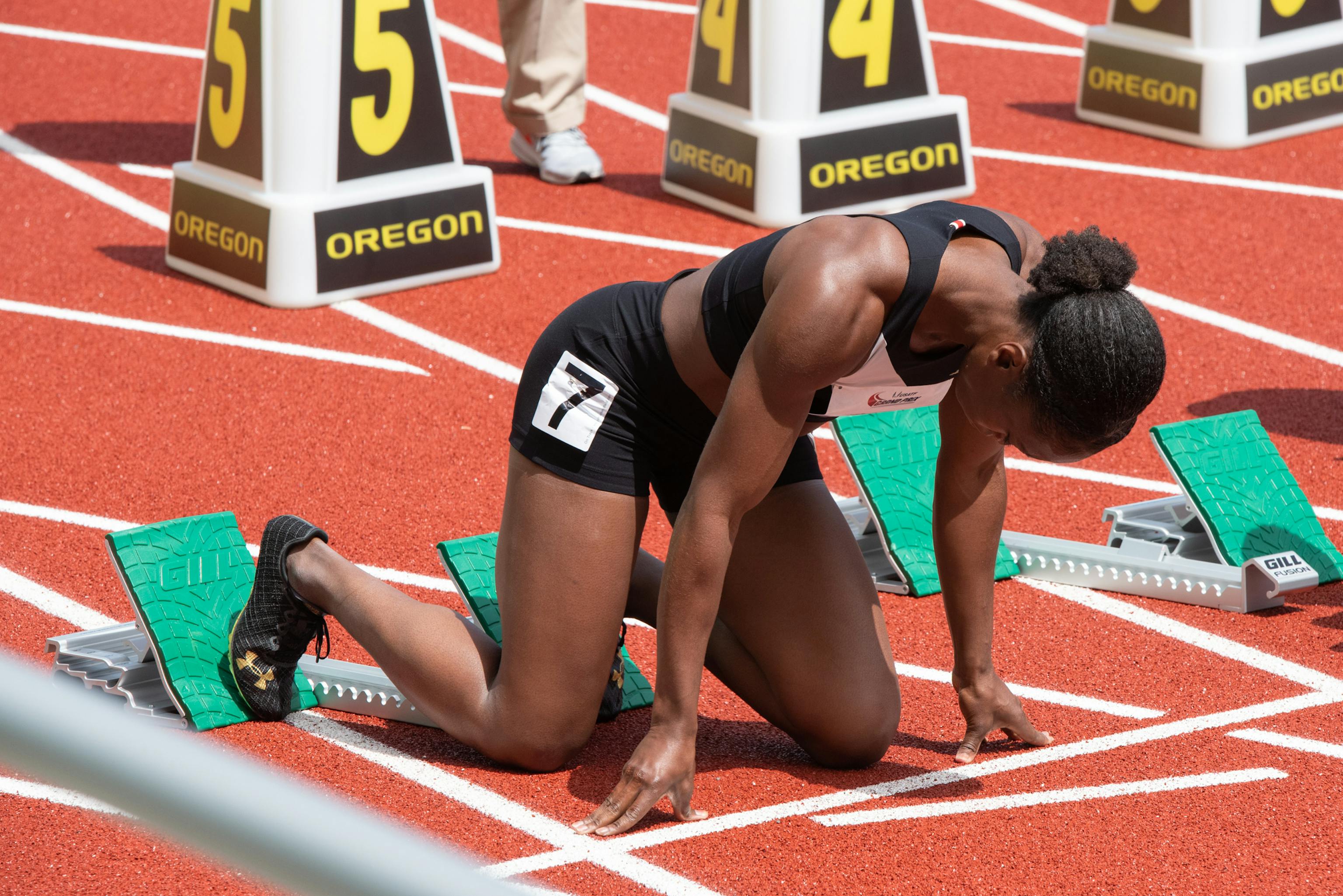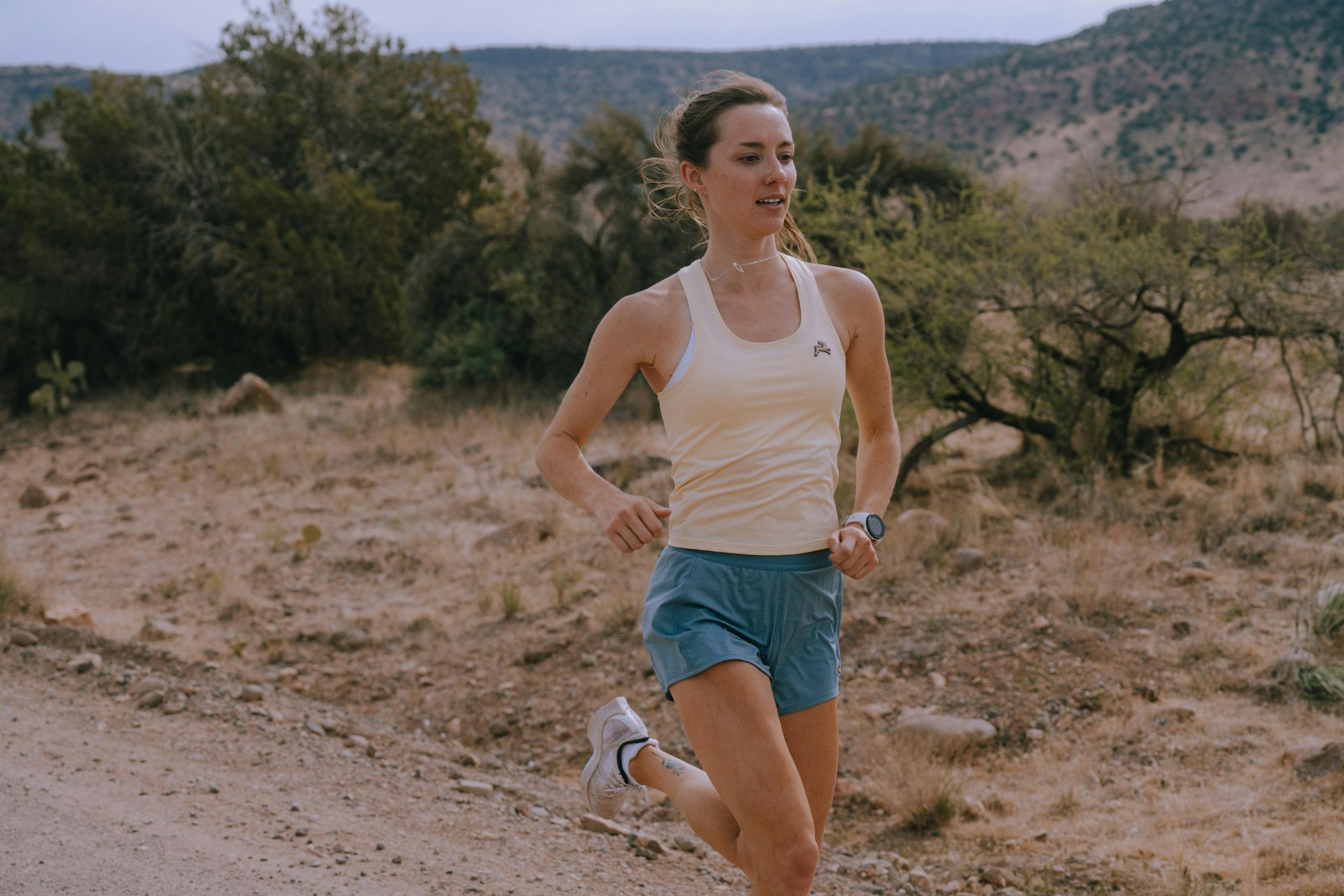
Dueling Disciplines
Carrie
Verdon
vs
Tianna
Bartoletta
Interview by Harry Gould
For this week's Dueling Disciplines discussion, Olympian sprinter and long jumper Tianna Bartoletta meets distance runner Carrie Verdon.
Tianna Bartoletta is a two-time Olympian and three-time gold medal winner. She is based in Berkeley, CA and is a yoga teacher and a volunteer assistant coach with the University of California, Berkley track and field team. She recently published her memoir, Survive and Advance.
Carrie Verdon is a first-grade teacher based in Boulder, CO. She competed for CU Boulder where she specialized in the 5k and 10k. Since then, she has run PRs of 15:18, 32:09, as well as 1:10:11 in the half marathon.
On Teaching and Coaching
Carrie: This is the last week of school so it’s getting a little crazy. I teach first grade, so the little ones. Every day is very different. Do you think you could ever teach?
Tianna: I think naturally, I am a teacher but not of little tiny humans. That is a special calling that I don’t see for myself. But, through yoga teaching and coaching, that’s all teaching for me. So, yes, but in a classroom, no. I admire all the people who do, but I couldn’t.
C: I’d agree with you, that’s definitely teaching and that’s something I’m not sure I could do.
T: I’m a volunteer coach with the University of California Berkeley track and field team and it’s a really hard job! Coaching doesn’t just take place when you’re at the track. To be a real good coach, you have to care about what all these young adults are doing every other hour away from the track. You have to walk this line. You think “Am I in their business too much?” and “Are they going to understand this?” but when they get it, it’s super rewarding.
C: Do you feel like you have to have a really strong connection with the athletes before you’re able to push them?
T: I know as an athlete, from the other side, I’m not really listening to anything a coach says before we have that relationship. I need you to understand why I’m out here in the first place. That is important to me and that we’re in this battle together. If you just come out barking orders about things I should do before taking a moment to get to know me or my struggles or why I’m out here, then it’s in one ear and out the other. In the coach's seat, I’m like I definitely need to spend some time with this person and listen more than I talk. I’ll be honest, it’s difficult when the personalities don’t mesh well. I feel bad for coaches who aren’t allowed to say “I just don’t like this kid!” because you’re not really allowed to say that. You’re not going to like everybody but you still have to find that connection and common ground.
C: That’s very similar to teaching. You get 30 kids in a class and every one of them is different. Even the ones that really push your buttons, you still have to find common ground.
T: What do you find is the goal of first grade?
C: For me, it’s to instill a sense of confidence and have them grow into the person they are. And that’s outside academics. Every kid comes in with a different standard of how they are in the classroom. Some kids are struggling at the beginning and I not only want them to be at grade level, that’s what the district tells me to do, but I also want to instill self-confidence in them.
T: It sounds like you’re empowering them. Once you’re empowered, you can learn anything. Aww, I needed a teacher like you! I almost got held back in kindergarten because the teacher didn’t take the time to understand why I was struggling. I was struggling because I was bored. I could already read so I was super bored with the letter tracing and stuff. She never took the time to understand why I was disruptive. Once we figured that out, it was actually my first-grade teacher who really empowered me. I was super happy when you said that was the grade you teach! That was a pivotal moment in my life.


On Work-Life Balance
T: That’s a lot of giving being a teacher. How much do you have left for you, your training, and your relationships? How does that work? I’m always super drained after a day of coaching even though it’s gratifying.
C: I have definitely struggled with that in the past. I remember when I first started teaching, every day I came home completely exhausted. I’ve since shifted my perspective on my time. I try to view whatever I’m in at that moment as I’m all in. When I leave, I’m not with that and I’m on to the next moment. My days are crazy busy, as I’m sure yours are too, trying to fit in work and training. Being present in the moment has really helped me. Sometimes you have to be honest with yourself and maybe run fewer reps or take an easy day instead of trying to push through.
T: I love that because people always ask me “how do you do so much?” and they want to talk about balance. For me, balance doesn’t exist. When I’m on a zoom call, I’m on a zoom call. When I need to do the next thing, I’m doing the next thing. I save myself from the anxiety of planning equal amounts of time for different things by just being right here, right now. The other thing I totally relate to, especially because people love to talk about how old I am when it comes to training and performance. I’ll be 36 this year. I always say what does it matter? The goal is to train the body you have, with what you have, on the day you have it. That’s true whether you’re 19 or 40!
On Mentality
C: Is that a mentality you’ve had to grow into or is it something you’ve always had? I feel that a lot of young women in the sport especially don’t understand that and that it takes time.
T: I had to grow into it for survival purposes because of the way our sport is; they will try to age you out before you are ready just because you had a birthday! It was weighing on me mentally and I was starting to believe it. When you hear it so much, “this is going to be your last run,” “this is it,” or “this was your window,” you start to believe it as true. My performances kept getting worse as I heard that. It was a self-fulfilling prophecy. In order to get off that train, I had to change my mentality. It’s obvious now, but I hate that it took me that long to figure it out.
C: Have you worked with a sports psychologist at all? You seem to have a very good head on your shoulders and I love it! You have so much knowledge and you’re so wise!
T: A lot of therapy, Carrie! And it’s finally paying off!
C: I love it!
T: My first appointment with a sports psychologist was a mandatory one with the track team back when I was at the University of Tennessee. Later, I branched off on my own with them and worked on visualization which was critical in helping me win my first World Championship title when I was a sophomore at Tennessee. After that, there was a whole lot of chaos that comes with sudden change like that so I started seeing a therapist just for life stuff. I have always, always, always been in therapy and I absolutely love having a therapist! Then, I added mental conditioning coaches to hone in on the performance side. We like to pretend that everything is separate and I’m very good at compartmentalizing what’s going on away from the track. However, the one thing I could never do was have a horrible mental state off the track and then be 100 percent fine on the track. It’s been about 20 years of all of this work.
C: I feel like it is just now starting to become a conversation in our sport about the mental aspect of things. People are like, “it’s all physical, you just have to train, train, train and you’ll do great” when in reality your mind or more than half of it. Alexi Pappas came out with that New York Times article about dealing with mental health. We give all this time and energy to treat physical injuries but we should do the same with mental injuries. I’m very happy that this is finally starting to get talked about.
T: I actually have her book right here next to me because it has such great insight. I’ve always assumed that distance runners were the most mentally tough athletes on the track. This is because one, I absolutely cannot do what you do, at all. Period. Second, you’re able to stay present lap after lap. I assumed that all of you were Jedis! What’s happening in your brain during an event like that?
C: For me, I try to stay as present as I can, which is very difficult over a 30-minute race like the 10K. I break it down by lap. I normally have a mantra that I repeat over and over again. I wish I could record my head in a really long race. By saying the same things over and over again, it brings me back to the present. People who aren’t in the sport think you just sit back and go with the flow. Really, to have a good race you have to be on it, pushing yourself - which can be really hard. I’ve found in my best races, I was the most present and in my worst races, I’ve disconnected. People always tell me I do the hardest event. I’m always like, no! The hardest events are the sprint events! I think the 400m hurdles is definitely the hardest. Hands down.
T: Exactly! You need the strength and stamina of an 800m runner and then you have to go and jump over ten barriers. But you sound like a yogi with your mantras and staying present. This makes so much sense to me because I practice yoga and the reason I do it is because it’s a moving meditation for me. It’s one of the few places I’m completely present. Mind, body, and breath are linked together. I can see how that is also true of the 5K and 10K. I have a friend that does ultra-marathons, which I think is absolutely ridiculous! But they’re just one step at a time for hours and hours and hours. Meanwhile, I run 100 meters and I can fall asleep for ten meters and then all of a sudden I’m losing. That’s something that I still have to work on even at a distance so short. Being present for each meter of the race.
C: Something that I’m always so enthralled by is that in a race like the 100, every step counts and milliseconds matter so much which is not the case at all for a 10K. If I have a bad start in the 10K, it’s absolutely no big deal. I can just make it up over the next 10 laps if I wanted to. It almost gives me anxiety thinking about starting in the start blocks of a 100m race because it’s the polar opposite. How do you train for that? Do you just do starts over and over again?
T: You nailed what it feels like. I’ve made two Olympic teams in this event and I’m still scared to death every single time I line up for the 100. I’m still scared because it’s such a do-or-die feeling. We do a lot of starts because leaving the blocks is a skill and you can screw yourself if you don’t have that. Then you’ve got shin angles of the acceleration pattern that you could mess up, you have a technique you use when you’re at top end speed if you are gripping or trying too hard - the body is no longer efficient and you lose ground. The desire to lean at the line actually makes you decelerate faster so you have to override all of these things in that short period of time. The only way I feel fully prepared is doing the reps over and over and over again.
C: I’m sure that’s part of the thrill. That’s why you come back to it. You’re kind of scared of it, but you’re also like “oh, let’s do that again.”
T: That’s me with scary movies! But that high you get from nailing it one time is like WOW. Running 10.7 seconds was like AHHHH! I still flashback to that. I’m like oh my gosh, I nailed one, I got one. It’s been 16 years of attempts, but that one, I might be able to ride that high for a long time. That’s why we keep coming back.
C: You’ve got two golds in the 4x100m and one in the long jump, so cool! Is it normal at an Olympic level to do both the long jump and a sprint event?
T: It is actually not that uncommon. It’s just less common now than it used to be. Carl Lewis, Marion Jones, Jackie Joyner-Kersee, and Gail Devers all of them did the sprint-jump double because jumpers are sprinters who are explosive. For me it’s the same training. On any given day you could come out to the track and be like “I thought she was a long jumper?” Well, this is a jumps workout! I’m sprinting, I’m doing plyometrics, I’m doing the same thing. Especially as a shorter, more powerful jumper, I really need to be sure my speed is perfect on the runway to get a good jump.

On Bobsledding
C: How did you get into bobsledding?
T: Uhhhh.
C: This is the question I’ve been dying to know!
T: After the London Olympics, I was ready to quit track and field. I had this idea of what the Olympic journey would be like and I was disappointed. It was really hard, I lost a lot, I sacrificed a lot, and I got a medal to show for it, but nothing else really changed for me. It was a what now situation. I really wanted to just be done. I also know that I'm very indecisive and I change my mind often. Instead of sitting on the couch and eating my emotions, I went to a different sport to get a break without completely quitting. That’s what opened the door to bobsled. The skills were very transferable. Coming off the starting blocks on the track, pushing the bobsled off the block on the ice track. There was still a learning curve for me but I’m very powerful. They called me Mighty Mouse because I was small. It was scary! Like we talked about how the 100m is scary, but I kept coming back to it. You want to conquer that fear. If there was a way for me to contribute to Team USA and I was done with track and field I would definitely consider it. What was the feeling when you got your qualifying marks, Carrie?
C: I was very excited! I feel like we’re at opposite ends of our career. I feel like you're on this world stage. You’re a gold medalist. You’re at the highest level of the sport. But for me, I feel like I’m just getting into myself in my athletic career. Getting an Olympic Trials qualifying mark for me was a really, really big deal. I finally did what I always believed I could do. I have had confidence in myself but my times haven’t always matched up. Now, I’m riding this momentum. I had a qualifier in the 5K and one in the 10K. Yeah it felt really good.
Advice for Trials
T: I don’t want to scare anyone, but it feels like the Hunger Games to me every time. You go in with your sponsors, your plan, and all the things that have gotten you to that point. For example, I find houses to rent and I make sure they have all the kitchen appliances I need so my meal plan stays exactly the same. I make sure that the internet works and all this stuff right to make sure when you walk into the arena, you are alone in your performance. It feels a bit like a fight to the death. You don’t need to care about your time. What matters is that you beat the people you need to beat to survive and advance. That makes it less of an internal thing than it is in the lead up. Now you need to execute in your lane, but you also need to beat all of them. It’s about beating people, not time.
C: I love that! I feel like I’m an underdog. It’s really fun to get into this big stage opportunity where time doesn’t matter; it’s about competing. I have literally nothing to lose. I’m so excited!
T: One of my college coaches made me skip Junior Worlds to go to the 2004 Olympic Trials for the experience. She knew I wasn’t going to win, but she was like, “take out as many people as possible.” That was the mission. I made the final in the long jump and took eighth place. You know how many people I took out? Even with nine medals, Carrie, I’m never the favorite. I feel you in the underdog situation. No one over picks me, after all this time. It’s a good place to be in. All you have to worry about is executing as well as you can and not succumbing to the pressure of this moment. You just have to do the damn thing and I think that you will!
On Long Term Goals
T: I hope to retire soon. Maybe not this year but after World Championships which would be fun to do on US soil. Mentally, I’m prepared for that. Physically, that’s a day-by-day thing. I want to be a writer when I grow up. I’ve just finally published my first book so I think I’m going to dive down that rabbit hole. Honestly, after dedicating my life to high performance for so long, I’m looking forward to just doing whatever I want to do.
C: What’s your book about?
T: It’s a memoir called Survive and Advance. It’s my origin story, why I chose track and field, spoiler, it’s not a profound reason, and the story behind all the medals.
C: My plan is to run a marathon by the end of this year and I’ll see where that takes me.
T: Which one?
C: I’m thinking of the Chicago Marathon.
T: That sounds like a hard pass from Tianna. I’ll go visit and wait for you at the finish line, though!

On Training
T: Distance runners, what are your speed workouts?
C: A speed workout for me would be 200s, 300s, or 400s. My all out 200m is probably like a 30. That’s as fast as I can possibly go. Usually, we save them for the end of the season before championship races we’ll do “speed” workouts. I imagine they’re very different from sprinter workouts.
T: I still find that incredible! Otherwise, are you just running miles to prepare for the 5K and 10K?
C: We usually do 800s, 1000s, and mile repeats around the track. Normally, they’re longer repeats at the beginning of a session and then toward the end we’ll do some 200s, 300s, or 400s to get the legs moving to similar a finishing kick. I probably only do four true speed sessions per year.
T: I’m thinking, as a sprinter, we do sprint in training, but we get to break it up with block starts, stadium stairs, hill runs, plyos so we’re not always running. I don’t like to run that much. It just sounds like so much running!
C: It is a lot of running! But I love it!
T: It shows! The most I’ll do for a workout is around 1600 to 3200 meters total in the fall. That could be something like eight 200s. We run those around 32 seconds, so Carrie you’re right there. When we’re in season, the other day I did one fast 250. In dramatic fashion, I laid out and passed out at the finish line for like 15 minutes!
C: Track and field is such an interesting sport to me. A lot of people are like “it’s one sport,” but within track and field there are so many different types of sports. I always wonder why track and field isn’t more popular to watch. It’s so different. You get so much bang for your buck. No one can be bored watching it.
T: It’s like the farmers market of sport!